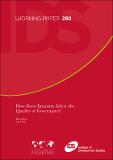How does taxation affect the quality of governance?
Abstract
This paper summarises the policy implications of a growing debate about the
connections between taxation and the quality of governance in developing
countries. Taxation – or the absence of tax – impacts on the quality of governance
through two main channels. The first relates to the degree of dependence of
governments on general taxation for their financial resources. Many governments
do not need to make much tax effort because they have large non-tax incomes
from oil, gas and mineral exports or from foreign aid. State elites are then
financially independent of citizen-taxpayers. This changes the political incentives
that they face, and the ways in which they seek to obtain, use and retain power.
The long term consequences for governance are malign: state elites are less
responsive and accountable to citizens; and, depending on the sources of non-tax
revenue, may have less incentive to build up the political and organisational
capacities of the state. States are likely to be simultaneously arbitrary and weak. All
else being equal, the dependence of governments on general taxation has positive
effects on the quality of governance. But that relationship is not automatic. How
governments tax also matters. We cannot assume that, because they are fully
dependent on taxation for revenues, governments will be capable, accountable, or
responsive. They may levy taxes coercively, and thereby damage state-society
relations and reinforce poor governance. Public authorities in contemporary poor
countries face some incentives to tax coercively. Establishing more consensual
taxation practices is an important practical route to improving governance. Aid
donors could play a more constructive role.
Keywords: taxation, accountability, responsiveness, state capacity, governance, aid,
oil
Citation
Moore, M. (2007) How does taxation affect the quality of governance? Working paper series, 280. Brighton: IDS.Is part of series
IDS working papers;280Library catalogue entry
http://bldscat.ids.ac.uk/cgi-bin/koha/opac-detail.pl?biblionumber=185454Rights holder
Institute of Development StudiesCollections
- IDS Research [1671]

